The throne room..
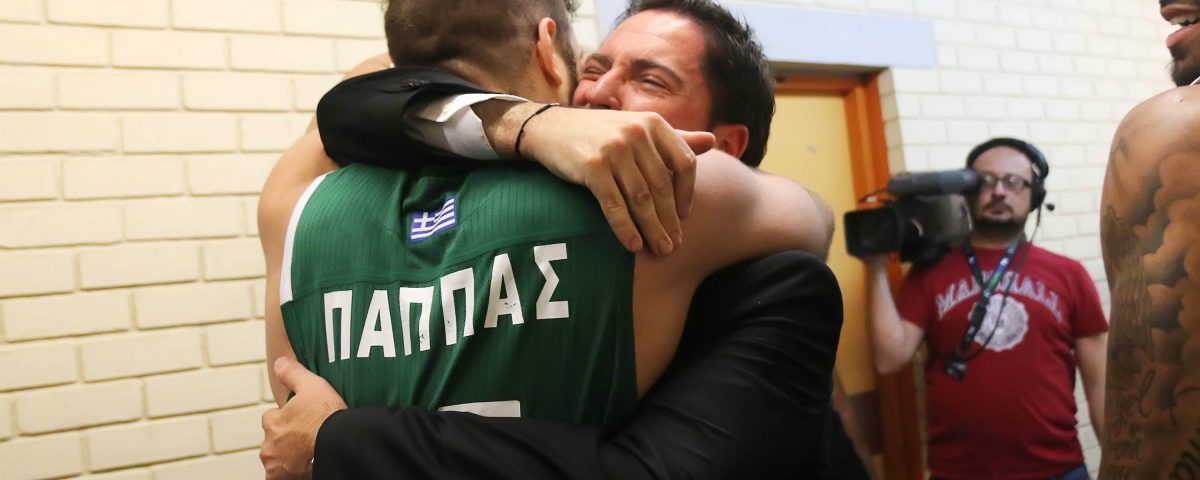
The throne room…
By Jim Katsionis on 15 June 2017
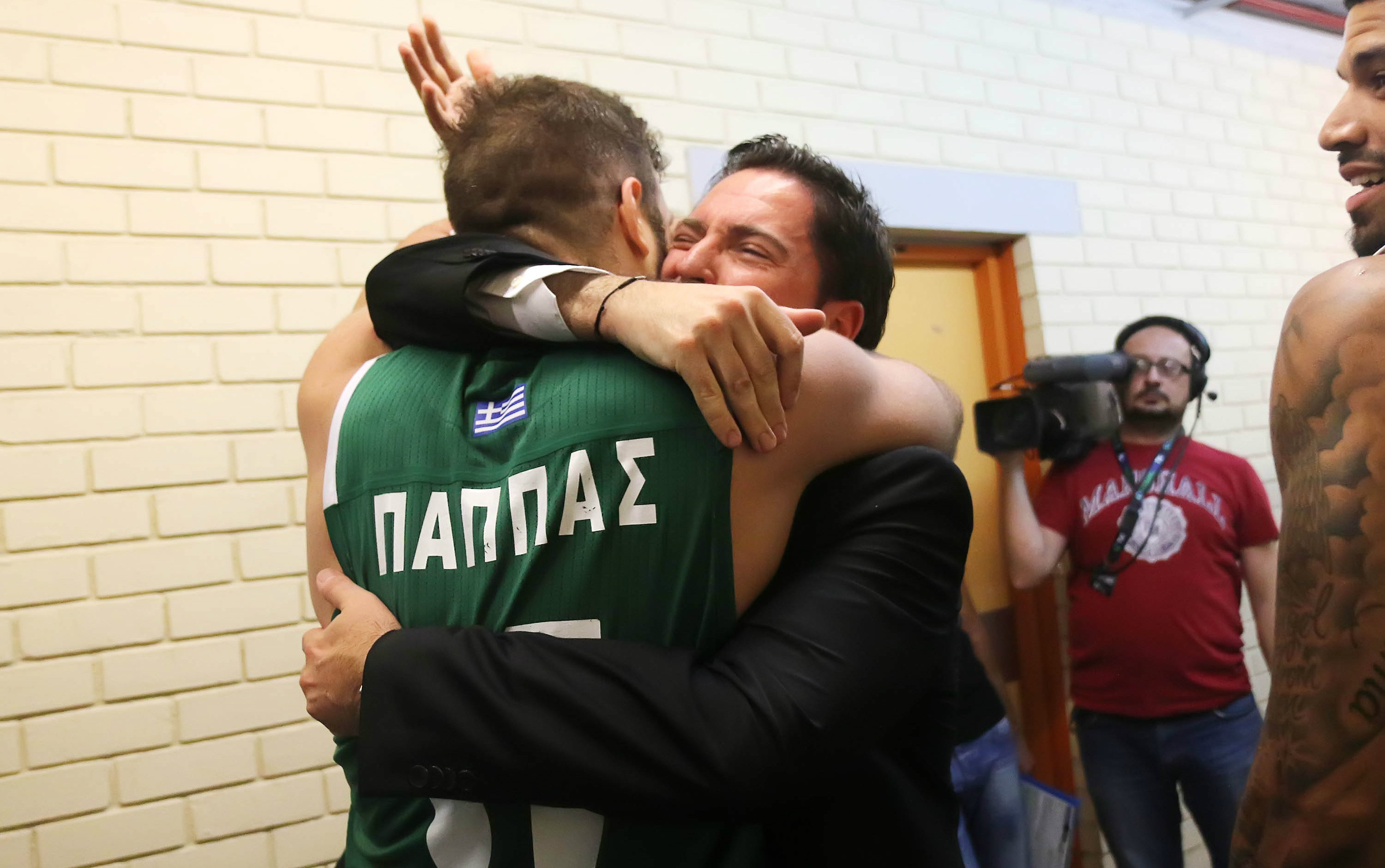
“There comes a time when our majesty, we ourselves have to move to the throne room with our court, mind and heart, to decide on the charter of our lives…” Hoopfellas on game 5 and the championship of Xavi Pascual’s Panathinaikos.
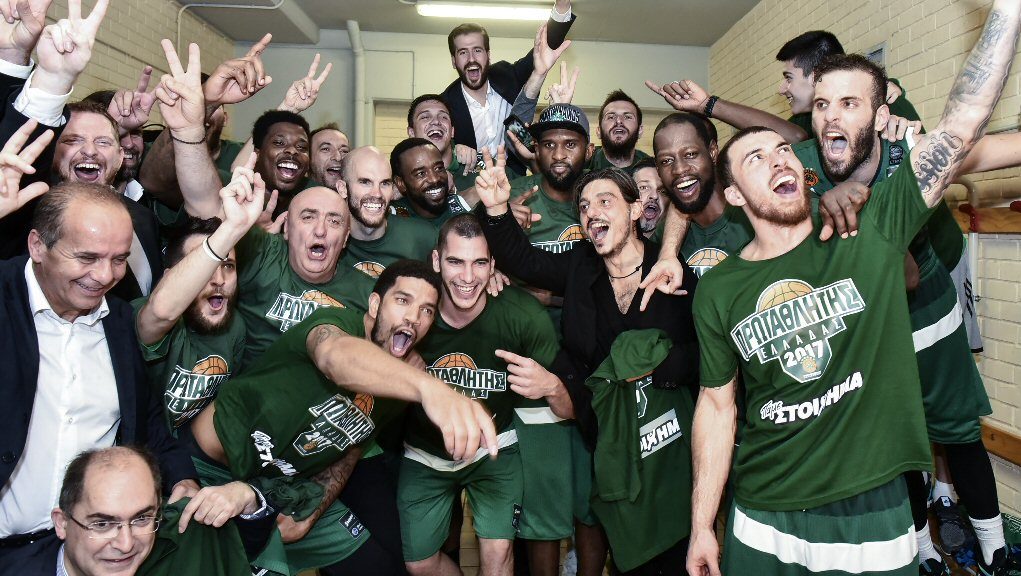
With a really imposing performance, for such a marginal game 5, Xavi Pascual’s Panathinaikos changed the atmosphere at SEF from the beginning, and prepared Olympiacos’ fans for what was to come. The “Clover” is back on the top with a double in the first season of the post-Diamantidis era. The club reacted as it did in the first season after another great loss in the modern history of the team… In both cases, Panathinaikos were asked to make a decision on their future (hence the title). This decision was to … carry on.
The many “octanes” of Panathinaikos
I think that somewhere in the middle of game 3, it started to show that Panathinaikos was the team with the best physical condition in the matchup, which proved decisive as the series went deeper. This is something the Greens “won” and the Reds staff “lost”, as it is directly related to the management and the decisions the coach makes throughout the season, weighing in every factor of a sudden “loss”, or unscheduled burnout of a player for various reasons. When the Greens decided to put Mike James next to Calathes last summer, we had talked about the vision of a non-stop motor backcourt that would make the difference in the end of the season. It didn’t work well with Fener, as Panathinaikos were unable to use their speed in that series, but it gave the final blow in the Greek league finals.
Game 5 was (mainly) decided by fatigue and Giannis Sfairopoulos, regardless of whether he refused to accept it (for his own reasons, I respect that while the series is still underway) knew well that his team was not the best conditioned team. Panathinaikos’ “octanes” were too much, as it was later proven for this Olympiacos team, who wanted to, but, was unable to follow the Greens, especially after Bouroussis’ minor injury showed that the Greens should play small, be more aggressive and up their defensive intensity, with Gist’s step up being the decisive factor , as it gave Panathinaikos the chance to “lock” their opponents’ offense. Panathinaikos’ “octanes” were perfectly used by the artistic mind of Xavi Pascual, who on one hand made mistakes, on the other, though, he was clearly the coach who affected the series more, looking at the excellent way he handled the rotation, and mainly the way he took advantage of the extra energy of his team in both matches.
Space the Paint
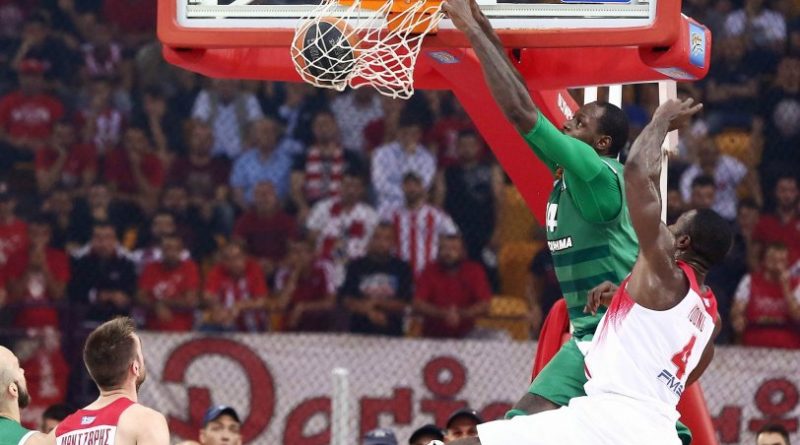
It was on this physical supremacy that the Catalan coach drew his plan and every action of his team both on offense and defense, aiming at getting his team in the driver’s seat and disappointing their opponents. It is clear that Panathinaikos’ goals and formations relied on this. Panathinaikos bet everything they had on one on one plays, both on offense and defense, knowing that the players with the most energy would have an advantage in one on one situations. This also is a path the team has walked on during the season…
The Guard-oriented, 4 out-1 in, with principles taken from Dribble Drive Motion offense (which is the new trend is American college basketball) managed to make their opponents put more effort and runs on defense with the duo of Calathes-James as the main ballhandlers being better on their first step and punishing coach Sfairopoulos’ persistence to avoid giving helps, fearing that if his players rotated many times, they would get tired. At the same time, their opponents constantly changed direction in their PnR offense in the same format (Gist diving, using low blocks depending on the ball’s position with Bouroussis pop out/dribble penetration/ “locking” of inside or outside miss match with Singleton), which made their offense have more options than it actually had.
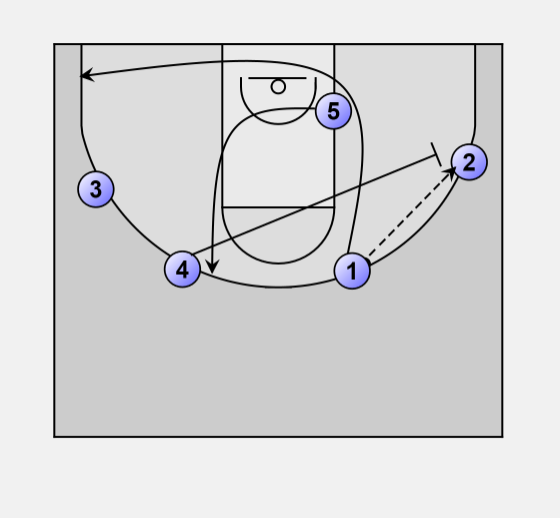
The way Panathinaikos “cleared” the space down low (even in entering the ball from out of bounds) showed how much their coach insisted in preparing this basic, inviolable rule of their offense.
In more static situations Xavi Pascual placed James on the corner of his strong hand (right), and in particular Gabriel (or Fotsis is a couple of cases) in the corner (corner-3), thus keeping the help from the baseline busy; Singleton was on the top of the middle lane, which created Sideline Triangle situations, for which we talked in a previous post. I must admit I liked that we saw Panathinaikos running actions we had pointed out as previously missing. I mainly refer to Calathes cuts on the back of the defense (in Post-ups by Bouroussis he was his support on the weak side with the Greens getting the minimum in preventing “size” in the help down low) and flat screens at 9 metres for James, so he can pass the three point line at a specific speed and space attacking the defense head on from the area of the middle lane.
Note: In the end, where it really counted, we saw how much Calathes upped his game when Panathinaikos played small and used Pick&Roll as their point of reference, with Gist playing better, increasing his minutes on the floor, and being the main choice for the “5” position. The offensive nature of the Greens defense with this compact formation produces more turnovers and open court conditions, which helps Calathes, in addition to the fact that its spread offense character creates more spaces in the paint.
Failure to create an advantage equals dead-end.
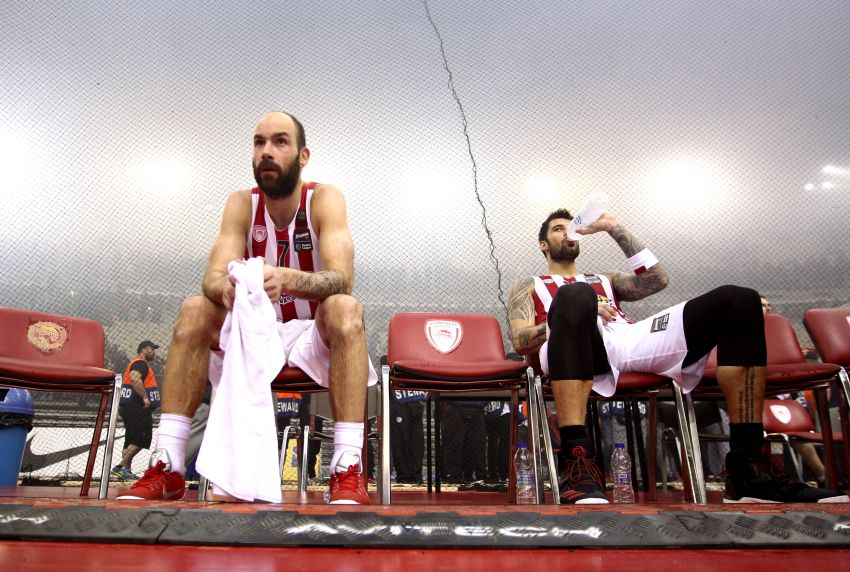
Unfortunately for them, Olympiacos experienced the breakdown seen in a team, whose main weapon has been disabled. The Reds based the entire operation of their offense on the creation of miss matches and one on one situations (which require extra dribbling), betting on the axis of Spanoulis-Printezis, and the way these two make defenses adjust and overhelp in order to stop them. On top of that, discipline in the number and nature of the executions left to the rest of the (mainly supportive) players, and this duo’s ability to lead the team to the free throw line, with the addition of transition execution (Lojeski’s presence on offense, as well as Hackett-Birch on defense), a derivative of their aggressive defense, Olympiacos climbed almost to the top of Europe by playing smart, but without having an efficient offense. However, without the advantage of the “well-trained team” and good footwork, Giannis’ Sfairopoulos’ team broke down. When they lost the AST/TO ration weapon that kept them afloat, it seemed almost impossible to follow their opponents. In the last three games of the finals Olympiacos had 40/97 two pointers, 19/65 three pointers and averaged 57.6 pointes.
The image of (the worn out) Printezis being completely unable to gain an advantage on one on one situations against Fotsis is the gist of the finals for Olympiacos. The image of the team being unable to gain the slightest advantage in Pick & Roll situations when their opponents played with Bousoussis and Fotsis in the same lineup shows what happened and may convince public opinion that 2-3 was a good result for the Euroleague finalists.
Note: Panathinaikos was also the winner of most one on one plays (Bouroussis against single defense in the low post). I told you the luxury coach Pascual had to activate single defense without helping in the best players of Olympiacos was a great win in terms of spacing…
This is the truth and the power of the image is immense… These are the same miss matches and the same situations, where the Reds exploited the most in the past year (taking into account last year’s finals as well) against their “eternal rivals”. Suddenly Olympiacos’ offense had no point of reference whatsoever. This showed in game 5 and it was very ugly…
For the better part of the season, when the Reds were winning game after game in the Euroleague, we talked about their offense that was lacking a deep playbook. We had pointed out that looking at what coach Pascual is trying (even though the offense of the Greens never got the flow they were looking for, and lacked duration in many cases), the Greens offense was far more interesting and had better prospects. Both of them (regardless of what finally happened) have inherent weaknesses that have to do with issues of structure and execution. Coach Sfairopoulos never was the coach that would build a multi-levelled, modern offense, as opposed to defense, where he is considered an expert. This is showcased by his ability to choose players with versatile defensive nature, as opposed to the cases where he is looking for a player to help his offense.
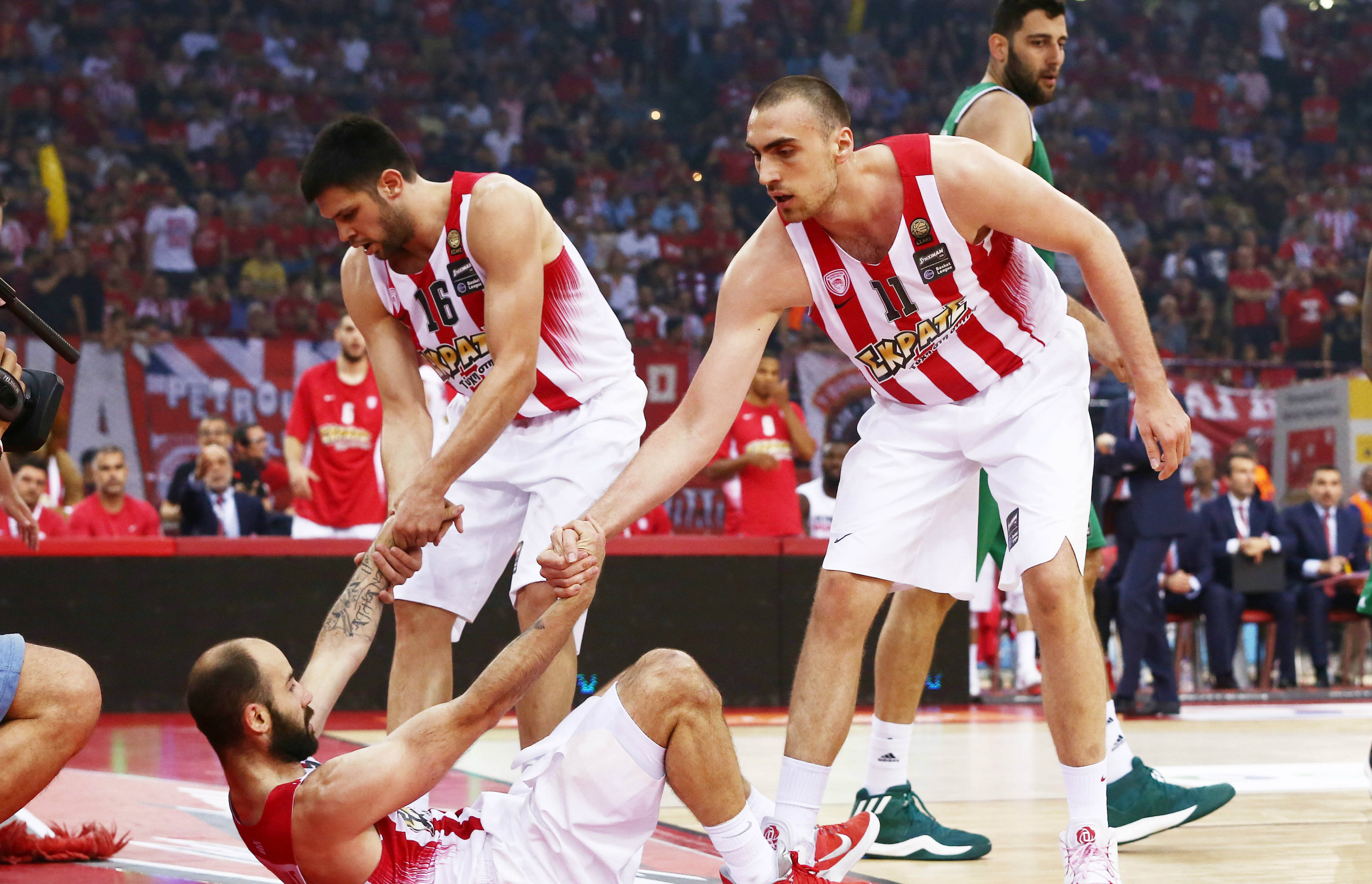
In this series, it became obvious that he was unable to do more, especially with the way this team had been structured and had learned to play. Constant overdribbling, poor footwork, dead-end one on one situations. The motor on defense was insufficient and unable to create offense, and the lack of alternative sources of creation in the half court (remember: single defense by their opponents) deactivated several players with specific skills (spot shooting, diving). Some of the new things the coach tried to use (in the form of new elements that could have led to creating a new horizon of production), such as for example getting the ball more to Papanikolaou (looking for wing attributes) or Milutinov’s post offense will be useful to Olympiacos in the next season. However, it’s obvious that as the Reds will continue with coach Sfairopoulos on their bench (which means that they will not be having a very sophisticated offense in terms of structure), they will have to add offensive firepower to their roster in terms of players/individual skills, leave aside the “monarchy” of the one year older Spanoulis-Printezis, and work towards a “crowned republic”. This is where Olympiacos must turn to in the offseason, looking at playmaking and one on one players in the right amount. We’ll talk about that in due time.
Entering this year’s offseason…
I wouldn’t like to write an epilogue to sum things up for the champions and cup winners of Panathinaikos or the Euroleague runner-up (who was left without winning a title this year) of Olympiacos today, meaning that entering the offseason we will have many opportunities to be more specific in reviewing the total image and needs of the two “eternals”. Panathinaikos returned to the top and won the recognition and trust of almost everyone on the man who was chosen to lead them in the new era, Xavi Pascual. This is very important for the organisation, after everything they’ve experience in the post-Zoc era. Pascual managed to get the moral bonus with his performance in this series, where he was the MVP (better yet, the “MVC”). Handling this loss will set the carpet for the next day for Olympiacos. The Reds were impressive in regard to their consistency and the excellent Euroleague they had, but they lost in the Greek league, and it appears that they will be needing reinforcements and improve their team in specific areas, adapting to the new needs of European basketball. What happened to the two teams in the Euroleague and the Greek league was not surprising. It could have happened the other way round. It could have happened based on what we saw from them this year. I think that Panathinaikos winning the championship again will help both teams.
More on that very soon… We are coming to the hotest part of the season, and Hoopfellas is … the place to be, as it is every year.
Regarding Sloukas...
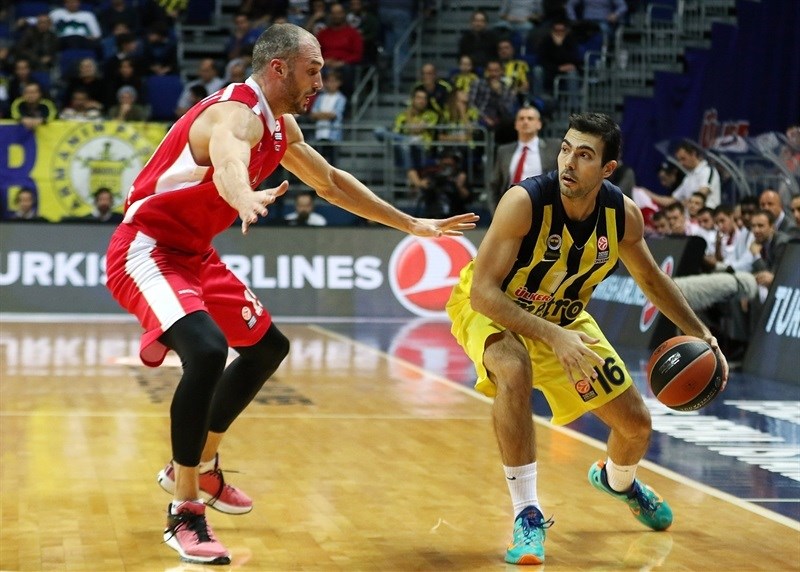
A few days before the Istanbul F4, before the taste of champagne left the mouths of Fenerbahce, I was informed on the Sloukas case and the future of the 27-year old international guard, which was a bit different from what I had in my mind. “Sloukas doesn’t feel entirely safe with everything that’s going on in Turkey. He is affected by the socio-political regime and he is seriously considering leaving the country”. This was, of course, known to the team, which has set up an entire mechanism (with the help of Dogus) to try to persuade the player, whom his coach considers very important for the new season. The same contact “believes” that Sloukas is thinking of how things will be shaken up (in regard to himself) if Bogdan Bogdanovic is replaced by a leading guard such as Wannamaker (who indeed needs the ball in his hands, but truth is that he was excellent in Bavaria and Brose’s multi pass-spread offense). Coach Obradovic is the champions’ strongest card in the Sloukas case and there is a general consideration in the Fener front office that, even if he tries to see what the market thinks of him, this will be done in order to win a bit of “love”. Coach Obradovic knows that now that his team is the team to beat of the new season, he doesn’t have the luxury of losing players of the team’s hard core, especially in such an important position as that of the point guard. Let me remind you that Sloukas-Bogdanovic were the main playmakers in Fenerbahce’s offense this year, and he will use the Serbian’s possible move to stress Sloukas’ importance in the team’s game next year… One the other hand (this may be the key to this case) there is also the thin moral line between the two sides. Coach Obradovic will not tolerate any of his players that are in the same position as Sloukas, to take advantage of the extra sponsorship of Dogus and try to get more money than what their team had in mind to pay. This is irrespective of the financial status of the club; it has to do with the coach’s philosophy…
Panathinaikos has approached the player and they will make an offer very soon. Hoopfellas has been visited this case two years ago… We don’t have to say much about how important and helpful Sloukas’ addition in the Greens backcourt may be (apart from the very strong boost of the Greek core of the team with an A-Class international player) in terms of functionality , upgrading it in areas in which they struggled last year. At the moment Fener is the frontrunner for keeping the player.
The “hot potato” in Mantzaris’ hands…
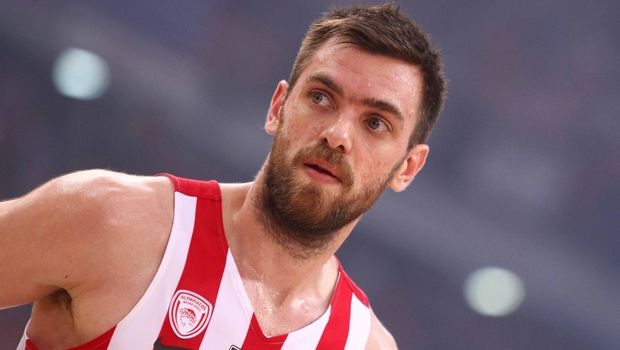
Yestarday, Hoopfellas, through its invisible spy “Afro” informed you of the Greens offer to Vangelis Matzaris, which included annual wages of 1.2 million euros. That’s a fact. Let’s go a bit deeper, though…
This offer shows the hunger of the “green” front office to build a quality hard core of Greek players, which will be the basis of the new team, and it also shows their will to weaken their “eternal adversary”, by chipping away on their great advantage (a strong Greek core). Vangelis Matzaris has not yet reached this financial status. He has been successful, but he is not “there” yet. That doesn’t mean, of course, that he can’t find this amount of money. The market doesn’t always work by the book, and is sometimes affected by financial events of a “special package”. Turkish players, such as Sinan Guler (the one we said that he would be perfect to replace Hackett a few months ago…) or Russian players are paid more by capitalising on the need the rule for native players in national leagues has created. Native players are paid more, and surplus value (especially in terms of playing hierarchy) has become a rule.
The international PG is Spanoulis’ alter ego in the Reds backcourt and his attributes are perfectly translated next to Olympiacos’ captain, as well as the way Greek teams play basketball at the highest level. However, Mantzaris never worked on his individual strengths in order to become as strong as a unit outside the protected environment of Olympiacos. He does not have one on one skills or shooting in middle execution (in particular, after dribble), his drive is weak, as is his finish, he does not have pure playmaking abilities, and he is technically far away from being considered complete. This is why he was not a “factor” until now in FIBA Tournaments. On the other hand, he is very perceptive, he plays a low mistake basketball (which I think is a great asset in modern basketball), he is a reliable spot shooter, and very strong on defense (both in individual and team defense, in particular on the back line of defense), where he relies on fundamentals. He has built a winning culture through his years in the Reds, and this is where his ability to make big shots derives from. His game is plain and simple, and feeds the proper team function. Are these enough to give him a seven figure annual salary…? No. However, the offer is there.
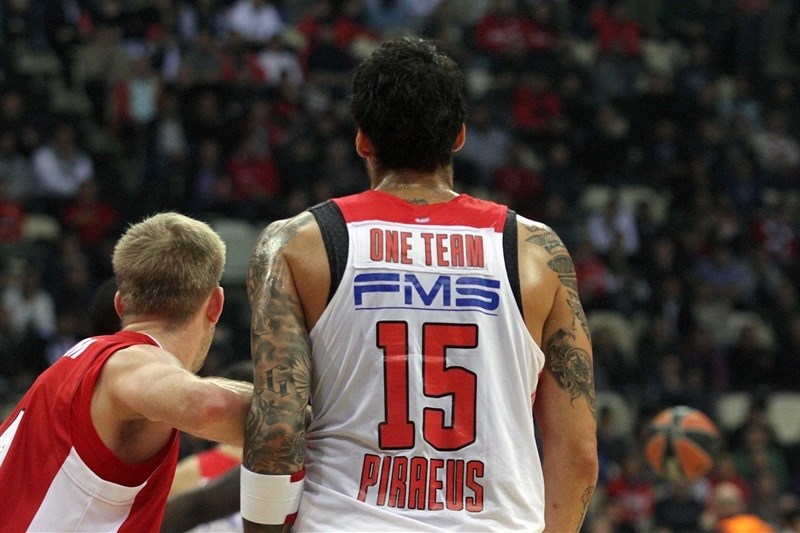
Olympiacos closed the Printezis issue quickly (I don’t think there was a doubt…), Mantzaris is the first “battle” of the offseason for the Reds front office. I think that despite the temptations, the player himself (looking at his mentality as a person and what he has done in similar situations in the past), first of all he has his eye set on his renewal with the Reds and how this can be achieved with the best possible conditions for him. Olympiacos is the best environment for him (a place in the starting lineup, established responsibilities, heavy minutes, known environment) in relation to Panathinaikos. However, it’s obvious (depending on how Mantzaris will play this hand) that the Reds may need to play a bit more than what they originally had in mind in order to keep the player on their roster. My feeling today 14 June 2017 is that Vangellis Mantzaris will stay with the Reds. Both he and Sloukas were difficult cases for the Greens to begin with. Mantzaris’ case has the less chances…
P.S.: As expected, Giorgos Printezis renewed his contract with the Reds, without spending any time in negotiations. This is the best for both sides. Hackett’s case, however, is not finished yet… He just has to prove that he is willing to take a step (maybe even several steps) back in order to stay.
Translated by: George-Orestis Zoumpos


